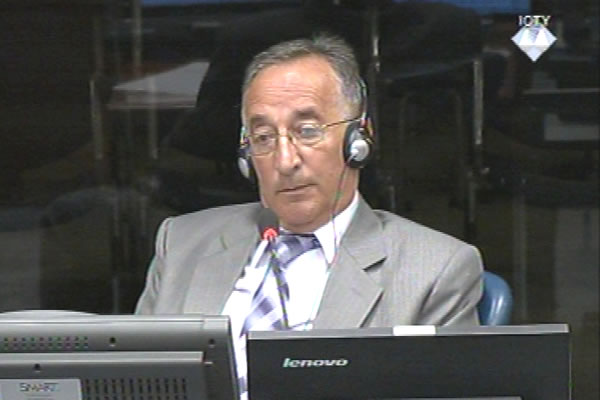Home
EVIDENCE ON EVENTS BEFORE AND AFTER PERIOD RELEVANT FOR INDICTMENT
In the examination-in-chief of General Dragan Lalovic, the defense insisted on getting his testimony on the pre-war incidents involving the JNA. The prosecution on the other hand dedicated a good part of the cross-examination to the period after the war, when the witness was the chief of Ratko Mladic’s security, while Mladic was a fugitive from international justice. As the hearing drew to a close today, the accused was removed from court
 Dragan Lalovic, defence witness at Rako Mladic trial
Dragan Lalovic, defence witness at Rako Mladic trial General Dragan Lalovic began his military career as a JNA officer, and ended his service in the Republika Srpska Army. During the war Lalovic commanded the 3rd Hercegovina Brigade, and later was appointed the commander of the 1st Motorized Brigade in his native Kalinovik. Lalovic is the first of the 10 witnesses heard so far at Ratko Mladic's trial who has not testified either at Radovan Karadzic's trial or at any other trial before the Tribunal.
In his statement to the defense team – and particularly in the examination-in-chief by defense counsel Branko Lukic – the emphasis was placed primarily on the events before the war in BH. In Lalovic’s view, Muslim extremists started the conflict when they attacked the JNA soldiers in Sarajevo. At that time, Lalovic held a post in the city. According to Lalovic, Muslims put up first road blocks on 1 March 1992. As a consequence, tensions increased and then several JNA soldiers were killed. Eventually, on 3 May 1992 the column of JNA troops was attacked in Dobrovoljacka Street.
Asked about the relevance of the evidence that pertained to the events that predated the crimes alleged in the indictment, defense counsel Lukic explained the evidence was called to refute the testimony of prosecution witness Robert Donia. In his evidence, Donia claimed that the first road blocks were put up by Serbs and that on 2 May 1992 the JNA tried to divide the city in two. The attempt was met with resistance. According to the prosecution, that part of Donia's report is merely there to provide context to the events, and is not very relevant. Consequently, Lalovic's testimony about those events lacks relevance too, the prosecutor argued today. ‘Mladic is not charged with starting the war’, the prosecutor noted.
In the cross-examination the prosecutor didn’t ask a single question about the events before the war, focusing instead on contesting the witness’s credibility because of his alleged bias in favor of the accused. The prosecutor put it to the witness that the accused and the witness were related: both are from the same municipality, and Mladic’s maternal grandfather was Filip Lalovic. The witness explained that he and Mladic were from the same municipality, but came from different villages. They were only ‘distant relatives’. As the witness explained, there were branches of the Lalovic family throughout the municipality. The family was so large that its members no longer considered themselves to be related: as a result, Mladic and Lalovic were not close relatives.
The second, possibly even closer tie between the witness and the accused stems from the fact that from 1997 to 2001 Lalovic commanded the military police unit that provided security to Ratko Mladic in the months after the war, first in Han Pijesak for a month, and then in Belgrade.General Lalovic didn’t see anything controversial about the fact that he had protected a fugitive from international justice for four years against ‘criminals and importuners’, as he put it in the statement. Lalovic thus also protected Mladic against those who wanted to arrest Mladic because he had been indicted by the Tribunal for genocide and other crimes. No arrest warrant was in effect ‘in my country’, Republika Srpska, the witness explained, adding that he thus saw no reason why he should not provide security to the accused.
To corroborate the claim that there was no arrest warrant, Lalovic said Mladic had not gone in hiding at all. In Belgrade, Mladic ‘moved around like anyone else', he went to the green market and did his shopping; he even attended football matches. Mladic lived in his family house and ‘from time to time’ stayed in military facilities in Stragari and Rajac. Mladic never stayed in the military barracks in Topcider in Belgrade. In 2003, two soldiers were killed there. Their parents claimed the soldiers died because they accidentally saw Mladic there. Lalovic explained that he learned about the event from the media. While he was in charge of Mladic's security, Lalovic noted, the accused didn’t stay in Topcider, but Mladic’s security detail was stationed there. After he left his post, Lalovic was identified as one of the people who were helping Mladic hide, and he faced a variety of sanctions imposed by the international community:his bank accounts were frozen and he couldn’t travel to the USA and EU.
After a rather long period of relatively good behavior in the courtroom, Mladic again acted up today, speaking louder than allowed. As the hearing drew to its end, the Trial Chamber decided to have Mladic removed from court, after he was warned several times not to stand up and not to talk loudly to his defense. When Mladic refused to comply with presiding judge Orie’s order to calm down and sit still, he was removed from court.
Linked Reports
- Case : Mladic
- 2014-05-30 MARKALE 1 COMMISSION: PHANTOM OR REAL?
- 2014-05-30 APPLICATION FOR A CHANGE OF RESIDENCE
- 2014-05-29 WHO BROUGHT PRISONERS TO FRONTLINES
- 2014-06-03 ‘MUSLIM SIDE RESPONSIBLE FOR POWER CUTS IN SARAJEVO’
- 2014-06-04 WHY AND HOW MUSLIMS LEFT PALE
- 2014-06-05 SEVERED HEADS ALL OVER SARAJEVO
